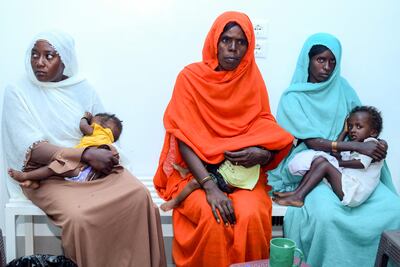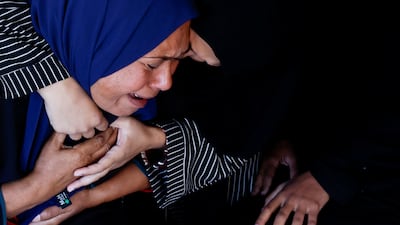“Do you consider us human?”
Each time I think of Gaza, I see the face of the woman who asked me this question, not once, not twice, but three times.
It is a question that still haunts me. A question that encapsulates the plight of an entire people – the expression of a last-ditch plea that despite everything that has happened to them, everything that is happening, they have not been abandoned by the world.
I visited Gaza in July 2024. Amid the shattered infrastructure, mass displacement, destruction and growing hunger, I also spoke with a man who shared a single hope. "We long for a ceasefire,” he told me. “For a chance to live without fear."
Gazans need food, water and medicine. They need protection and security. They need a solid foundation on which to rebuild their lives. Earlier this month, on December 10, the world marked Human Rights Day, and their plight is a reminder that the fight for human rights is not about abstract ideals. It is about creating the conditions that make it possible for people to live with dignity.
A child's right to safety, to be able to live and grow in dignity, to attend school and access health care must not be reduced to geography. Surely this is something on which we all agree. Yet the reality is that for millions of people around the world access to health care, education and security – necessary conditions to lead a dignified life – is determined by where they were born.

The right to health is enshrined in the 1948 Universal Declaration of Human Rights and the 1948 Constitution of the World Health Organisation. More than 140 countries recognise health as a right in their constitutions. But recognition is one thing, implementation another.
When people’s very survival is compromised by violent conflict and deprivation, recognition in the absence of action rings deafeningly hollow. In Gaza, more than 25,000 people have sustained life-changing injuries and 15,600 require urgent medical evacuation. However, only around 5,200 have been evacuated so far. Almost half of these are cancer patients. Forty per cent have sustained war injuries and 200 suffer from kidney disease. Since the closure of the Rafah border crossing in May 2024, only 359 patients have been evacuated.
And what of other populations caught in conflict zones around the world, where political decisions, borders, checkpoints and the vagaries of war determine who receives lifesaving care and who does not?
Imagine trying to get to a hospital with a loved one, where you know their life can be saved. But there’s a fence in the way, or a checkpoint. Or the road has been destroyed. That physical barrier – a political decision made concrete – decides who lives and who dies.

Recognising the right to health involves more than facilitating access to medical care. It also includes the social determinants of health. It includes access to clean water and adequate nutrition, to shelter and safe living conditions, all of which are undermined by conflict – be it political, armed, civil or international.
Yemen has become another textbook example of a compounded crisis. Food insecurity, malnutrition and displacement disfigure the lives of 18 million people. Over five million children under five and 2.7 million pregnant and lactating women urgently need nutrition support. Around 2.4 million children suffer from acute malnutrition, putting them at high risk of death and disease. How long must they endure this? How many more souls should suffer, and how many more lives must be lost before the world acts?
Conflict in Sudan has left more than 25.6 million people facing hunger. The violence has caused mass displacement: 11.4 million people are displaced within the country and another 3.2 million in neighbouring states. Gender-based violence has alarmingly increased since the conflict began. The situation of women and children, who face the greatest barriers in accessing food, shelter and health care, continues to worsen. How long can this situation continue? How many more must suffer as the world stands by?

Sanctions, intended as political tools, can restrict access to food, water and essential medical supplies, exacerbating the suffering of civilian populations in those countries. Historical examples demonstrate that sanctions can directly affect fair access to healthcare services. Studies have also shown that sanctions targeting non-health sectors can indirectly hinder healthcare access if the sanctioned country cuts healthcare funding to maintain other activities.
The plight of refugees exemplifies how political decisions and conflict strip entire populations of their rights. Forced from their homes, refugees often find themselves in overcrowded camps, living in limbo and unable to work, with little if any access to basic rights like health care and education.
In these situations, women and children are particularly vulnerable. In conflict zones and beyond, gender inequality exacerbates the trampling of human rights. Women and girls are disproportionately affected by violence, sexual exploitation, abuse and lack of access to essential services, and endure suffering that often goes unnoticed. It is pushed to the margins.
Today, around the world, 4.5 billion people lack access to essential health services, and two billion face financial hardship due to healthcare costs. In the region served by the WHO’s Eastern Mediterranean office, spanning 22 countries from Morocco to Pakistan, almost half of the population lack access to such services.
Human Rights Day reminded us that the right to health, safety and dignity is a universal human right, not a privilege reserved for the fortunate few. It reminded us that the pursuit of human rights is the pursuit of freedom, equity and the dignity of all people, everywhere. Without exception.
Seventy-six years have passed since the Universal Declaration of Human Rights – more than three quarters of a century during which it has become crystal clear that conflict always erodes the foundations that sustain human rights. Without peace, human rights can never be fully realised.
The theme of this past Human Rights Day 2024 – "Our rights, our future, right now" – served to underline how human rights play a critical role as a preventative, protective and transformative force for good and can empower people and communities to build a healthier and safer future. It reminded us that to promote the protection of these rights we must engage with the most vulnerable populations and understand their needs.
Our future depends on our ability to protect the rights of everyone, everywhere. But to achieve lasting human rights for all, we must prioritise peace.
Without peace, the promise of human rights remains just that – a promise, unfulfilled.
The pursuit of human rights is not just a moral imperative; it is a pursuit of our collective humanity. Let us answer the call and respond to the question asked by the vulnerable everywhere: “Do you consider us human?”


